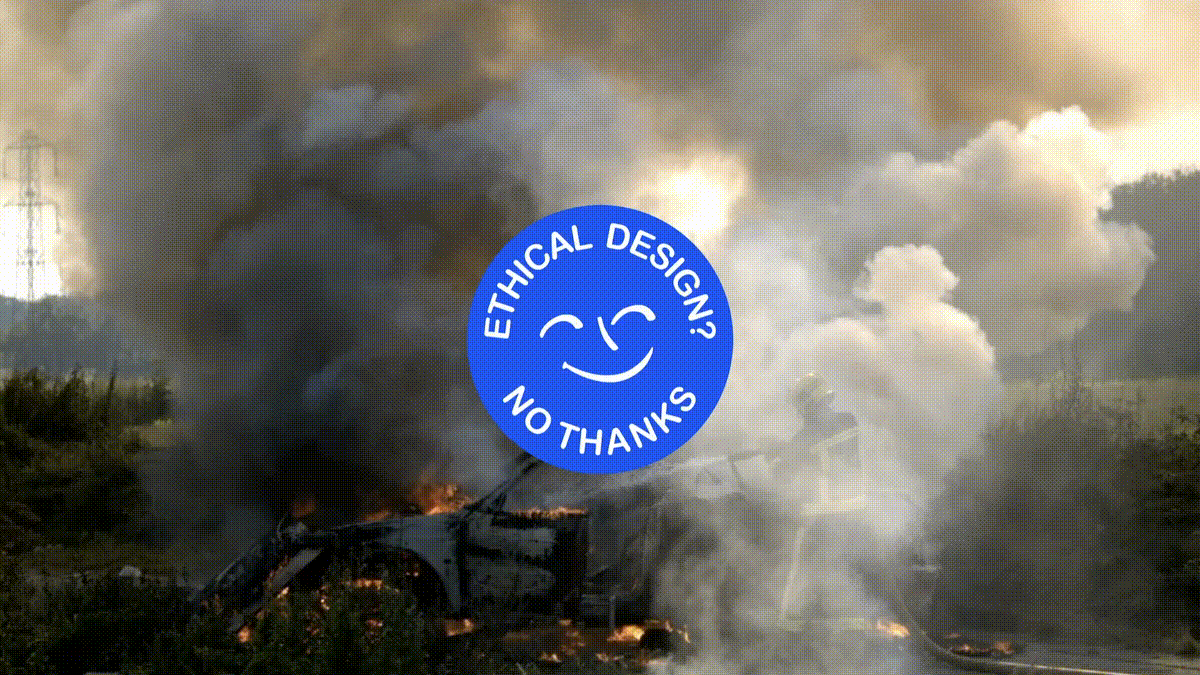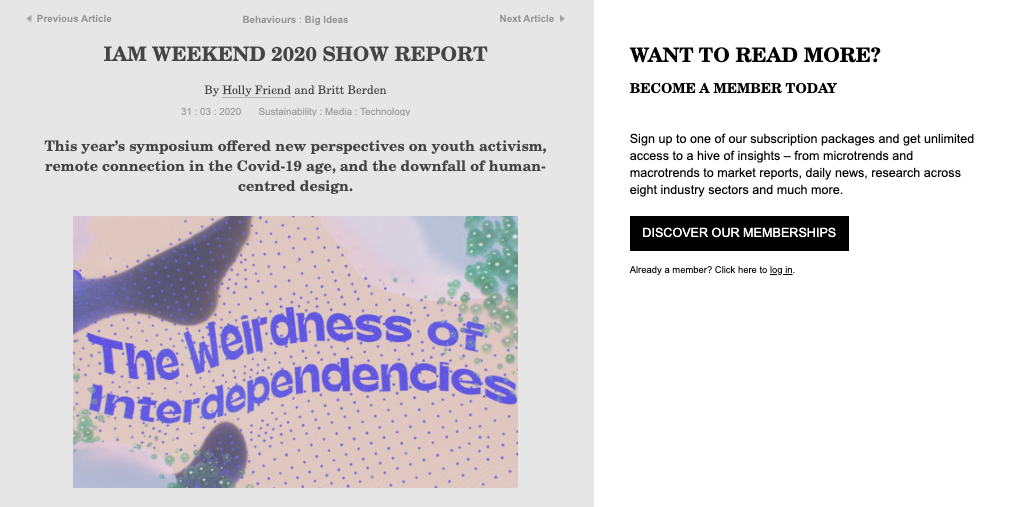IAM Weekend 2020
Show Report
This year’s symposium at the IAM Weekend 2020 Show offered new perspectives on youth activism, remote connection in the Covid-19 age, and the downfall of human-centred design.
Covid-19 as a catalyst for digital innovation
With the pandemic transforming IAM Weekend 2020 into a live online experiment, Covid-19 was unsurprisingly a hot topic in many of the event’s sessions and workshops.
While many speakers predicted that an environmental and behavioural reset will follow the current landscape of fear and uncertainty, some shared messages of optimism. During Thursday’s Unconference – in which attendees could host their own remote discussion – many explored short-term solutions to help consumers deal with the Covid-19 crisis. Some suggested a new platform to digitally map WhatsApp volunteer groups, while others highlighted the free access to coronavirus information offered by Government Zero, which does not require an internet connection.
Others are developing more long-term plans. Engineer Daveed Benjamin is designing a tool that stems from his start-up Bridgit, which is described as a ‘map for the internet’. His upcoming Covid-19 Mapping Project aims to fight the information gap and spread factual awareness about the virus, allowing users to generate an interactive knowledge map.
With the travel and hospitality sector facing bleak prospects, Martin Rosengaard is reshaping his Human Hotel brand to prepare for an uncertain future. The platform was launched as a way to humanise the home-sharing model by enabling guests to stay with activists and artists all over the world. However, with social distancing in full operation, the brand is adapting to become a digital platform that connects diverse people for online conversations. ‘Our mission is not to get the most bookings,’ he says. ‘It’s to create the most meaningful meetings.’
 Ethical Design? No Thanks by Cade Diehm
Ethical Design? No Thanks by Cade Diehm
Human-centred design is dead
In recent years, the UX designers and technologists of Silicon Valley have promoted a mantra of ‘human-centred design’. However, at IAM Weekend, multiple speakers were quick to challenge the cliché, citing its fluffiness, abstraction and general untruth as reasons for doing so.
Cade Diehm, a ‘tech pessimist’ and founder of The New Design Congress, explored the technology industry’s failings to interpret design ethics, resulting in what he calls weaponised design – ‘where an interface harms a user exactly as it was designed’.
Meanwhile, IF founder Sarah Gold proposed a solution – society-centred design. In her manifesto, she explained that brands are trying to solve problems only in the moments when people are consumers, rather than treating them as citizens.
'How can UX be designed so people spend as little time using it as possible, while fulfilling the app’s purpose?'
- Christina Chen, digital designer
While modern design is largely individualistic, Gold argues that brands must shift their focus to designing with a collective lens; for example, opening up their products and services for the common good, ensuring economic opportunity for vulnerable people and designing for people’s digital rights, such as privacy.
When it comes to building the apps of the future, digital designer Christina Chen believes designers must refocus from monetisation and repetitive sessions to more socially driven benefits. ‘For example, how can UX be designed so people spend as little time using it as possible, while fulfilling the app’s purpose?’ she asks. Brands should also consider new metrics of success, such as environmental wellbeing or the number of people who have learned new skills.
Brands must fight the monoculture
IAM speakers also took to the web to confront the homogeneous nature of the internet. While many digital platforms were once designed to broaden our horizons, giving us information and granting access to everything and anything, experts believe it has become a highly repetitive and restrictive tool.
Introducing her Fuck The Monoculture project as a spoken-word poem, Anushka Sani, founder of Thought Over Design, argued that consumers are using the internet to find a space of commonality in which we behave, act and express ourselves in similar ways, even though we are unique. She believes that we need to find new language, aesthetics and actions to embrace our distinct individuality online.
'Google is broken; it needs fixing. Everyone is selling us better. But we're living in an age in which 'less bad' becomes good.'
- Ted Hunt, critical designer
One of the weekend’s most solution-driven speakers was critical designer Ted Hunt, who believes that the hegemony of Google Search is feeding an online monoculture by condensing our universal knowledge. ‘Google is broken; it needs fixing,’ he told attendees. ‘Everyone is selling us better. But we’re living in an age in which ‘less bad’ becomes good.’
In response, Hunt has crowdsourced an alternative, This, a proposed new search engine with multiple algorithms to collectively imagine an internet with diversified outcomes. Rooted in different types of knowledge, these alternatives included a search engine based on grief, astrology, history and even another point of view – such as gender, age, culture and language.
During an interactive workshop session, Hunt also invited attendees to design their own search engine and find new ways to broaden our cognitive spectrum. By exploring the internet through new perspectives, such as indigenous knowledge and non-human realities, Hunt believes we can expand our consciousness and disrupt a linear way of thinking.
Lab Notes
: Design is being redesigned. As Sarah Gold notes, brands must eradicate claims of purpose and human-centrality and instead shift their focus to designing for societal good. For more, read our new macrotrend Post-purpose Brands
: Humans are keen to view life through new perspectives. As explored by Ted Hunt, the internet has the potential to offer this, and brands must create tools to help expand our collective consciousness.
To find out more about the IAM Weekend 2020 Show Report and gain access to our exclusive trend reports at LS:N Global, become a member today.
Want to read more?
Become a member today!
Sign up to one of our subscribtion packages and get unlimited access to a hive of insights - from microtrends and macro trends to market reports, daily news, research across eight industry sectors and much more.
Discover our memberships
Already a member? Click here to login

